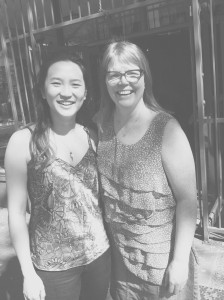
Learning from organizing against gentrification in San Francisco: Interview with Chanel Ly and Wendy Pedersen

At the end of March, four Vancouver Downtown Eastside (DTES) organizers went to San Francisco to learn about how people there are organizing to fight gentrification. The four are King-mong Chan, Jannie Leung, Chanel Ly and Wendy Pedersen. On April 20th The Volcano interviewed Wendy and Chanel about what they learned.
Volcano: Wendy, you said your brain was exploding on the trip. Why was it exploding?
Wendy: It seems like in San Francisco we visited the old growth forest of organizing when all that we’d seen here was Stanley Park. Organizing there is so deep and wide and complex. They’ve managed to fund a lot of community organizers to work on maintenance issues in buildings. Then they are in a good position to tackle affordability, evictions, gentrification, and displacement.
Chanel: I visited a lot of Chinatown organizers. It was really inspiring. I almost gave up on organizing seniors in Vancouver. A lot of the San Francisco groups are organizing seniors to fight for renter protections, preserving Chinatown, and ensuring there’s affordable housing being built. I underestimated how much seniors can do for their community. The power is with them because they’re the roots of the community. What’s exciting in San Francisco is that they have clear leadership structures and ways to build leadership. Non-engaged people can access services and then counselors will tell them to come to a meeting. The more meetings they attend, the more they see that their problem is not isolated and that it requires the community to change things structurally.
Wendy: Chanel and I are both realizing that community organizing is about long-term relationships with people. There they are building capacity through service organizations and doing campaigns.
Chanel: The San Francisco organizations are saying you can provide all the services you want, but ultimately you have to change the system.
Volcano: How many people are involved in their campaigns?
Wendy: One group had 16 staff people organizing around rent control, evictions and gentrification. Another group had 8 staff. Right there they had more staff doing organizing than we have in all of Vancouver.
Chanel: At the Homes for All Convention in Chicago, I learned that all successful social movements brought out 3.5% of the population being impacted. It’s encouraging if that’s all we need to create change – 3.5% of the Downtown Eastside whose collective voice is super strong.
Wendy: San Francisco is just a bit bigger than Vancouver, but the situation is worse there when you look at the numbers. They have 7,000 homeless. The average rent for a 2 bedroom is $5,000 a month. A bachelor rents for $2,000. They only have rent control on buildings built before 1979 and landlords can raise the rent when a tenant moves.
Volcano: Are they working on homelessness?
Wendy: Maybe some are but I only visited groups working with renters. I didn’t hear anyone talking about trying to get new social housing there.
Chanel: When they talk about making housing permanently affordable, their solution is that the community owns the land. They talk about Community Land Trusts.
Volcano: Where do they get the money to buy the land?
Wendy: From governments, private fundraising and buying land with their own equity. They said to look at the Dudley Street model in Boston because that government took a lot of land from property owners and gave it to them.
Chanel: Organizers in SF want the tech industry to donate a billion dollars to the land trust.
Volcano: We need 5,000 units in the DTES. Could a Community Land Trust get enough money for this?
Wendy: I don’t think we can hope to get 5,000 units unless we build strong people power to force government to do it. The big lesson for me is to figure out how to build more capacity so we have more people power.
Volcano: How do the organizers in San Francisco work with people in the different language groups?
Chanel: What I witnessed is everyone organizing in their own community but finding ways to connect with the other communities that are affected by the same forces. People see that different communities are fighting for the same thing. Whatever is happening to their community is bigger than them. When communities are brought together in events they ensure that it is accessible with interpretation.
Volcano: What are the lessons for us, organizing in BC?
Chanel: I think we have to keep trying to bring people together because we’ve been divided for so long. People have to make it a priority to ensure that events are always accessible, especially the language component. We also need to work within our own communities to learn the history of other groups. With Chinese seniors I’m hoping to talk about the impact of colonialism because there’s a very shallow understanding of why there are so many poor Indigenous people in the DTES. We need to be reminded of how they supported each other earlier on when the Chinese were forced to find ways to make a living and the Indigenous folks let them farm on their land, especially on the Musqueam lands.
